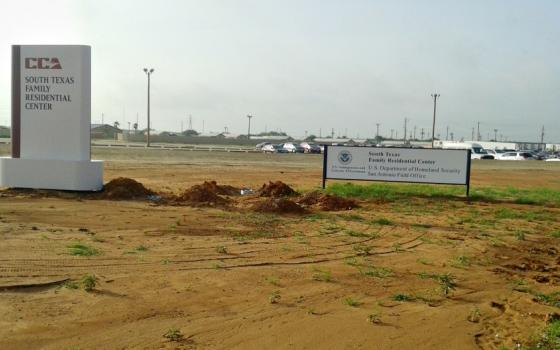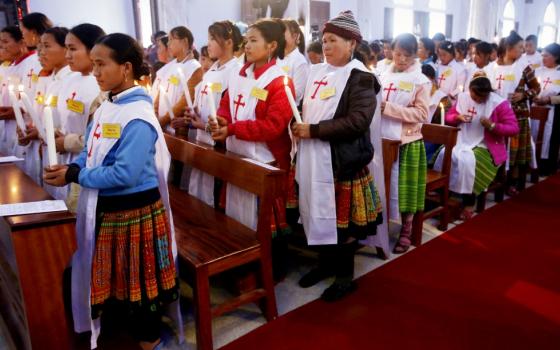The battle to protect the legal rights of those asking for asylum at the United States' southern border continues.
Now, the fight is over access to legal counsel. The Dilley Pro Bono Project, a consortium of the Catholic Legal Immigration Network, the American Immigration Council, the American Immigration Lawyers Association and Texas RioGrande Legal Aid, filed a lawsuit June 1 to challenge a new Immigration and Customs Enforcement policy that restricts the types of legal services the Dilley Pro Bono Project can provide and interferes with its ability to effectively represent clients.
The South Texas Family Residential Center in Dilley, Texas, holds mothers and children from Guatemala, El Salvador and Nicaragua who came to the U.S. border and asked for asylum but were instead arrested. The three countries are overrun with violence, and thousands of people have fled for their lives.
Most who reach the border are registered and allowed to enter the United States while their asylum case is heard, but many are detained and processed for deportation. The Dilley Pro Bono Project works to ensure their asylum cases are handled properly and that detainees' rights are protected.
The lawsuit stems from ICE barring Caroline Perris, a project legal assistant, from entering the facility, because she set up a mental health evaluation of a client via telephone. The evaluation, project officials said in a statement, proved critical in establishing the client's eligibility for asylum and averted the deportation of the woman and her child. ICE then barred Perris from the facility, saying medical evaluations via telephone require pre-approval.
"This policy places DPBP legal staff in the untenable position of having to choose between potentially compromising the needs of their clients, whose cases move quickly, or putting themselves at risk of losing their access to the facility by providing the legal services they consider to be in their clients' best interests," the statement said.
Dilley Pro Bono Project officials point out that their clients' asylum cases depend on their ability to tell what happened to them, but the trauma they experienced often makes it difficult or impossible.
"The overwhelming majority of clients served by DPBP have experienced severe forms of trauma, including child abuse, rape, incest, and domestic violence," the statement said. "Mental health evaluations often provide crucial evidence for clients facing immediate deportation by establishing that the trauma they suffered hinders their ability to recount the circumstances that led them to flee their home countries." The Dilley Pro Bono Project is a partner in the CARA Family Detention Pro Bono Project.
Legal victory for Guatemalans
A lawsuit filed by Guatemalans against a Canadian mining company will be allowed to move forward, which may not sound like big news but is actually a huge legal victory. While Global Sisters Report has not covered this specific case, we have reported extensively on mining issues in various countries, including Guatemala, in our ongoing mining series.
The legal team representing the Guatemalans says that until recently, Canadian courts usually dismissed these types of cases in favor of letting the case be heard in the country where the dispute occurred. That, the team said in a statement, had shielded Canadian companies — especially mining companies — from oversight of their operations overseas.
In this case, men from San Rafael Las Flores, Guatemala, are suing Tahoe Resources Inc., which operates its Escobal silver mine there. The men allege they were shot by the mine's security forces during a peaceful protest in 2013. Tahoe Resources, which issued a statement afterward saying the protest involved about 20 people armed with machetes and that its security forces used only tear gas and rubber bullets, argued the case should be heard in Guatemala.
The plaintiffs argued they cannot get a fair trial in Guatemala, where, The Nation reported, the government overruled five local referendums against the mine and turned the area around the mine into a police state, outlawing demonstrations and arresting opposition leaders. Tahoe Resources' Guatemala security manager, Alberto Rotondo, was criminally charged in Guatemala, but escaped from house arrest and fled to Peru. Six police officers were convicted for allowing him to escape.
The plaintiffs allege battery and negligence on the part of Tahoe Resources, but the case has been on hold while the question of venue was decided. The Court of Appeal ruled in January the case should be heard in Canada, the statement said, because "there is some measurable risk that the appellants will encounter difficulty in receiving a fair trial against a powerful international company whose mining interests in Guatemala align with the political interests of the Guatemalan state."
That decision was upheld by the Supreme Court of Canada June 8, which declined to hear Tahoe Resources' appeal, meaning the trial court can now hear the case.
Religious control in Vietnam
The Union of Catholic Asian News reports that Catholic bishops in Vietnam have bluntly told the communist government it tramples religious rights and a new law will only strengthen its belligerence:
This mechanism shows that religious freedom is really not considered a human right but a grace that needs permission [from the government]," said the statement signed by Archbishop Joseph Nguyen Chi Linh, head of the Catholic Bishops' Conference of Vietnam, and Bishop Peter Nguyen Van Kham, its secretary general. "It is the mechanism itself to legalize the government's intervention in religions' internal issues and its tight control over religious activities.
UCAN said the statement was addressed to the head of the National Assembly and its 500 members.
The new Law on Belief and Religion takes effect Jan. 1.
Remember, links, tips and accounts of the response to any crisis anywhere in the world are always welcome at dstockman@ncronline.org.
[Dan Stockman is national correspondent for Global Sisters Report. Follow him on Twitter @DanStockman or on Facebook.]


